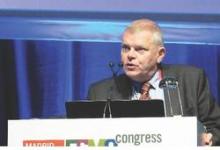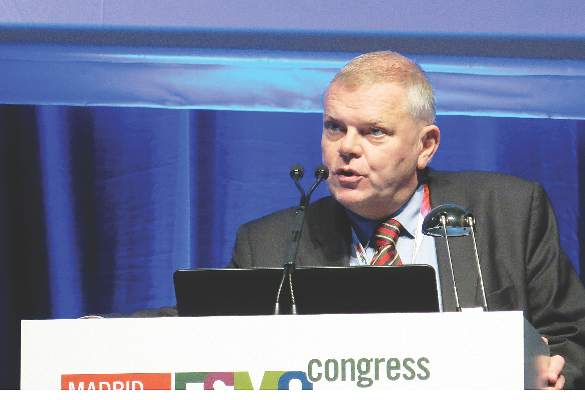User login
MADRID – The future of lung cancer vaccines was dealt a strong blow with a full look at the disappointing phase III MAGRIT results.
Lead author Dr. Johan Vansteenkiste described adjuvant vaccination as a promising strategy that was formally tested in the appropriate disease setting with an adequately designed and powered trial.
“This means for me, that therapeutic vaccination with the current technology does not work in lung cancer,” he concluded in a presidential symposium at the annual congress of the European Society for Medical Oncology.
The MAGRIT (MAGE-A3 as Adjuvant Non–Small Cell Lung Cancer Immunotherapy) study assessed the efficacy of MAGE-A3 cancer immunotherapy (MAGE-A3 CI) in completely resected stage IB to IIIA non–small cell lung cancer (NSCLC) positive for melanoma-associated antigen 3 (MAGE-A3).
MAGE-A3 is not expressed in normal cells but is found in about a third of stage IB-IIIA non–small cell lung cancer and in a variety of other cancers. The vaccine, which contains a recombinant MAGE-A3 protein and a novel immunostimulant AS15, previously showed activity in a small study of resected lung cancer.
In MAGRIT, however, adjuvant MAGE-A3 CI failed to best placebo on the coprimary end points of disease-free survival in the overall population (median 60.5 vs. 57.9 months; hazard ratio, 1.02; P = .73) and in those without adjuvant chemotherapy (median 58.0 vs. 56.9 months; HR, 0.97; P = .75).
There was no benefit observed in any subset analysis, Dr. Vansteenkiste, from University Hospitals Leuven, Belgium, said.
Vaccine developer GlaxoSmithKline announced this spring that MAGRIT was being stopped after failing to meet its first and second coprimary end points and acknowledging that the third coprimary end point of identifying patients with a potentially predictive gene signature wasn’t feasible.
Although MAGE-A3 CI is dead in the water for NSCLC, GSK said in a statement it plans to continue to search for a predictive gene signature for the vaccine in patients with melanoma in the phase III DERMA trial.
MAGRIT randomized 2,272 patients 2:1 to 13 intramuscular injections of recombinant MAGE-A3 CI or placebo over 27 months, with or without up to 4 cycles of platinum-based chemotherapy. Overall, 52% of patients received adjuvant chemotherapy and 98% had a performance status of 0 or 1. The median age was 63 years.
Median overall survival was not reached in either arm, although on a positive note, the modern approach used in the global trial will likely result in an expected 5-year overall survival above 50% in both arms, Dr. Vansteenkiste said enthusiastically. Overall, MAGE-A3 CI was generally well tolerated.
Invited discussant Dr. George Coukos, director of the Ludwig Center in Lausanne, Switzerland, said future opportunities for vaccines in NSCLC may lie in autologous whole tumor antigen vaccines and in personalized molecular vaccines based on mutanome analysis.
Dr. Martin Reck, chief oncology physician, with Hospital Grosshansdorf, Germany, said in a statement that the MAGRIT results are disappointing and that “The concept of vaccination in lung cancer has to be questioned and checkpoint inhibition might be pursued instead.”
MADRID – The future of lung cancer vaccines was dealt a strong blow with a full look at the disappointing phase III MAGRIT results.
Lead author Dr. Johan Vansteenkiste described adjuvant vaccination as a promising strategy that was formally tested in the appropriate disease setting with an adequately designed and powered trial.
“This means for me, that therapeutic vaccination with the current technology does not work in lung cancer,” he concluded in a presidential symposium at the annual congress of the European Society for Medical Oncology.
The MAGRIT (MAGE-A3 as Adjuvant Non–Small Cell Lung Cancer Immunotherapy) study assessed the efficacy of MAGE-A3 cancer immunotherapy (MAGE-A3 CI) in completely resected stage IB to IIIA non–small cell lung cancer (NSCLC) positive for melanoma-associated antigen 3 (MAGE-A3).
MAGE-A3 is not expressed in normal cells but is found in about a third of stage IB-IIIA non–small cell lung cancer and in a variety of other cancers. The vaccine, which contains a recombinant MAGE-A3 protein and a novel immunostimulant AS15, previously showed activity in a small study of resected lung cancer.
In MAGRIT, however, adjuvant MAGE-A3 CI failed to best placebo on the coprimary end points of disease-free survival in the overall population (median 60.5 vs. 57.9 months; hazard ratio, 1.02; P = .73) and in those without adjuvant chemotherapy (median 58.0 vs. 56.9 months; HR, 0.97; P = .75).
There was no benefit observed in any subset analysis, Dr. Vansteenkiste, from University Hospitals Leuven, Belgium, said.
Vaccine developer GlaxoSmithKline announced this spring that MAGRIT was being stopped after failing to meet its first and second coprimary end points and acknowledging that the third coprimary end point of identifying patients with a potentially predictive gene signature wasn’t feasible.
Although MAGE-A3 CI is dead in the water for NSCLC, GSK said in a statement it plans to continue to search for a predictive gene signature for the vaccine in patients with melanoma in the phase III DERMA trial.
MAGRIT randomized 2,272 patients 2:1 to 13 intramuscular injections of recombinant MAGE-A3 CI or placebo over 27 months, with or without up to 4 cycles of platinum-based chemotherapy. Overall, 52% of patients received adjuvant chemotherapy and 98% had a performance status of 0 or 1. The median age was 63 years.
Median overall survival was not reached in either arm, although on a positive note, the modern approach used in the global trial will likely result in an expected 5-year overall survival above 50% in both arms, Dr. Vansteenkiste said enthusiastically. Overall, MAGE-A3 CI was generally well tolerated.
Invited discussant Dr. George Coukos, director of the Ludwig Center in Lausanne, Switzerland, said future opportunities for vaccines in NSCLC may lie in autologous whole tumor antigen vaccines and in personalized molecular vaccines based on mutanome analysis.
Dr. Martin Reck, chief oncology physician, with Hospital Grosshansdorf, Germany, said in a statement that the MAGRIT results are disappointing and that “The concept of vaccination in lung cancer has to be questioned and checkpoint inhibition might be pursued instead.”
MADRID – The future of lung cancer vaccines was dealt a strong blow with a full look at the disappointing phase III MAGRIT results.
Lead author Dr. Johan Vansteenkiste described adjuvant vaccination as a promising strategy that was formally tested in the appropriate disease setting with an adequately designed and powered trial.
“This means for me, that therapeutic vaccination with the current technology does not work in lung cancer,” he concluded in a presidential symposium at the annual congress of the European Society for Medical Oncology.
The MAGRIT (MAGE-A3 as Adjuvant Non–Small Cell Lung Cancer Immunotherapy) study assessed the efficacy of MAGE-A3 cancer immunotherapy (MAGE-A3 CI) in completely resected stage IB to IIIA non–small cell lung cancer (NSCLC) positive for melanoma-associated antigen 3 (MAGE-A3).
MAGE-A3 is not expressed in normal cells but is found in about a third of stage IB-IIIA non–small cell lung cancer and in a variety of other cancers. The vaccine, which contains a recombinant MAGE-A3 protein and a novel immunostimulant AS15, previously showed activity in a small study of resected lung cancer.
In MAGRIT, however, adjuvant MAGE-A3 CI failed to best placebo on the coprimary end points of disease-free survival in the overall population (median 60.5 vs. 57.9 months; hazard ratio, 1.02; P = .73) and in those without adjuvant chemotherapy (median 58.0 vs. 56.9 months; HR, 0.97; P = .75).
There was no benefit observed in any subset analysis, Dr. Vansteenkiste, from University Hospitals Leuven, Belgium, said.
Vaccine developer GlaxoSmithKline announced this spring that MAGRIT was being stopped after failing to meet its first and second coprimary end points and acknowledging that the third coprimary end point of identifying patients with a potentially predictive gene signature wasn’t feasible.
Although MAGE-A3 CI is dead in the water for NSCLC, GSK said in a statement it plans to continue to search for a predictive gene signature for the vaccine in patients with melanoma in the phase III DERMA trial.
MAGRIT randomized 2,272 patients 2:1 to 13 intramuscular injections of recombinant MAGE-A3 CI or placebo over 27 months, with or without up to 4 cycles of platinum-based chemotherapy. Overall, 52% of patients received adjuvant chemotherapy and 98% had a performance status of 0 or 1. The median age was 63 years.
Median overall survival was not reached in either arm, although on a positive note, the modern approach used in the global trial will likely result in an expected 5-year overall survival above 50% in both arms, Dr. Vansteenkiste said enthusiastically. Overall, MAGE-A3 CI was generally well tolerated.
Invited discussant Dr. George Coukos, director of the Ludwig Center in Lausanne, Switzerland, said future opportunities for vaccines in NSCLC may lie in autologous whole tumor antigen vaccines and in personalized molecular vaccines based on mutanome analysis.
Dr. Martin Reck, chief oncology physician, with Hospital Grosshansdorf, Germany, said in a statement that the MAGRIT results are disappointing and that “The concept of vaccination in lung cancer has to be questioned and checkpoint inhibition might be pursued instead.”
AT ESMO 2014
Key clinical point: Adjuvant lung cancer vaccination failed to improve disease-free survival in early-stage non–small cell lung cancer.
Major finding: Disease-free survival was nearly identical with adjuvant MAGE-A3 CI and placebo in the overall population (median 60.5 months vs. 57.9 months; HR, 1.02; P = .73) and in patients without adjuvant chemotherapy (median 58.0 months vs. 56.9 months; HR, 0.97; P = .75).
Data source: Double-blind phase III study in 2,272 patients with resected MAGE-A3–positive non–small cell lung cancer.
Disclosures: GlaxoSmithKline Biologicals SA funded the study. Dr. Vansteenkiste reported fees from GSK as the primary investigator for MAGRIT. Dr. Coukos reported no conflicting interests.

